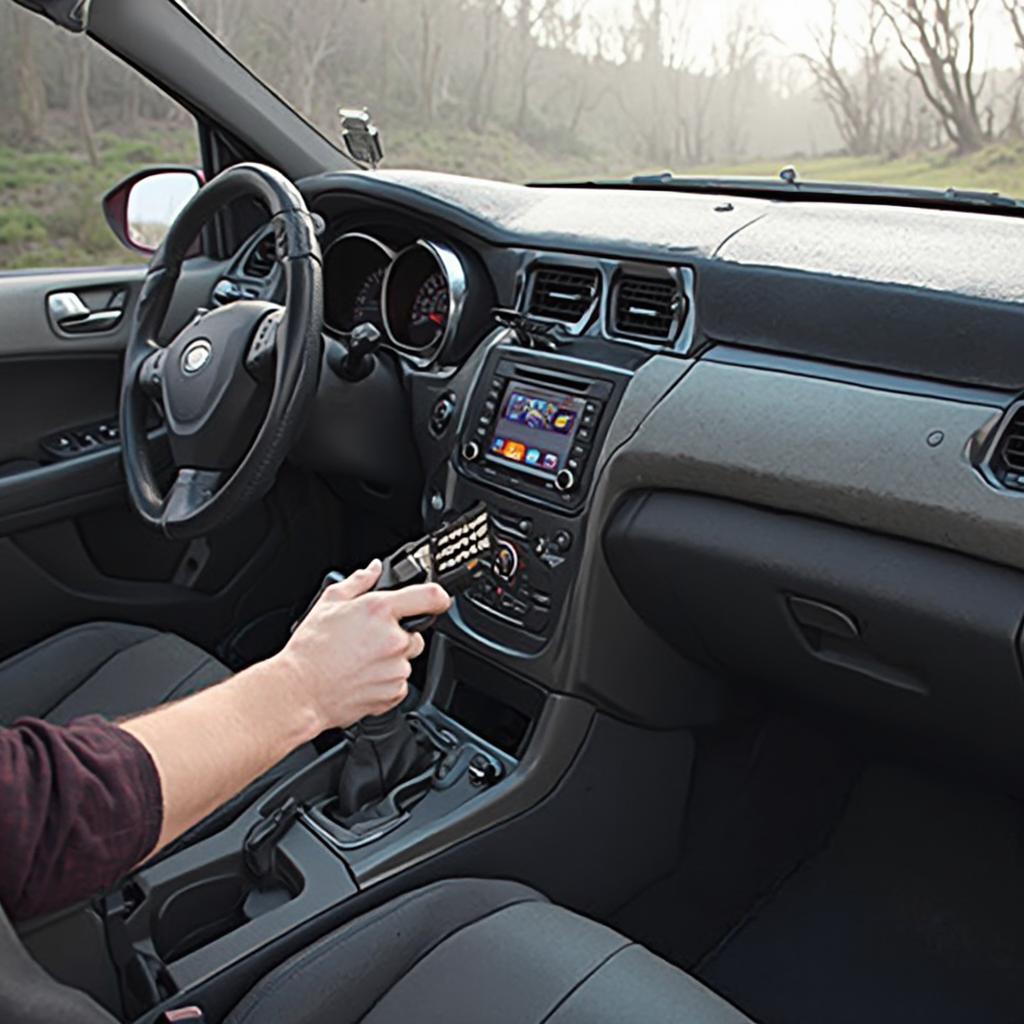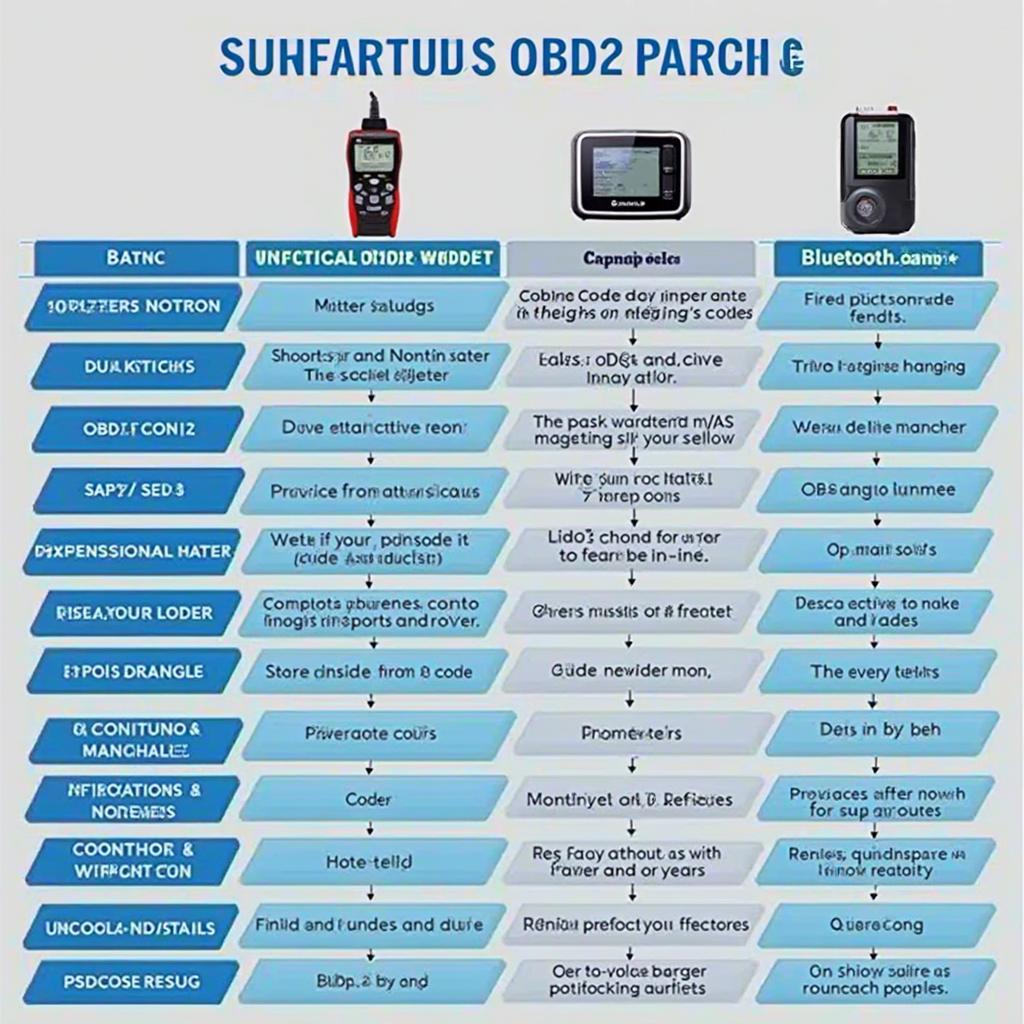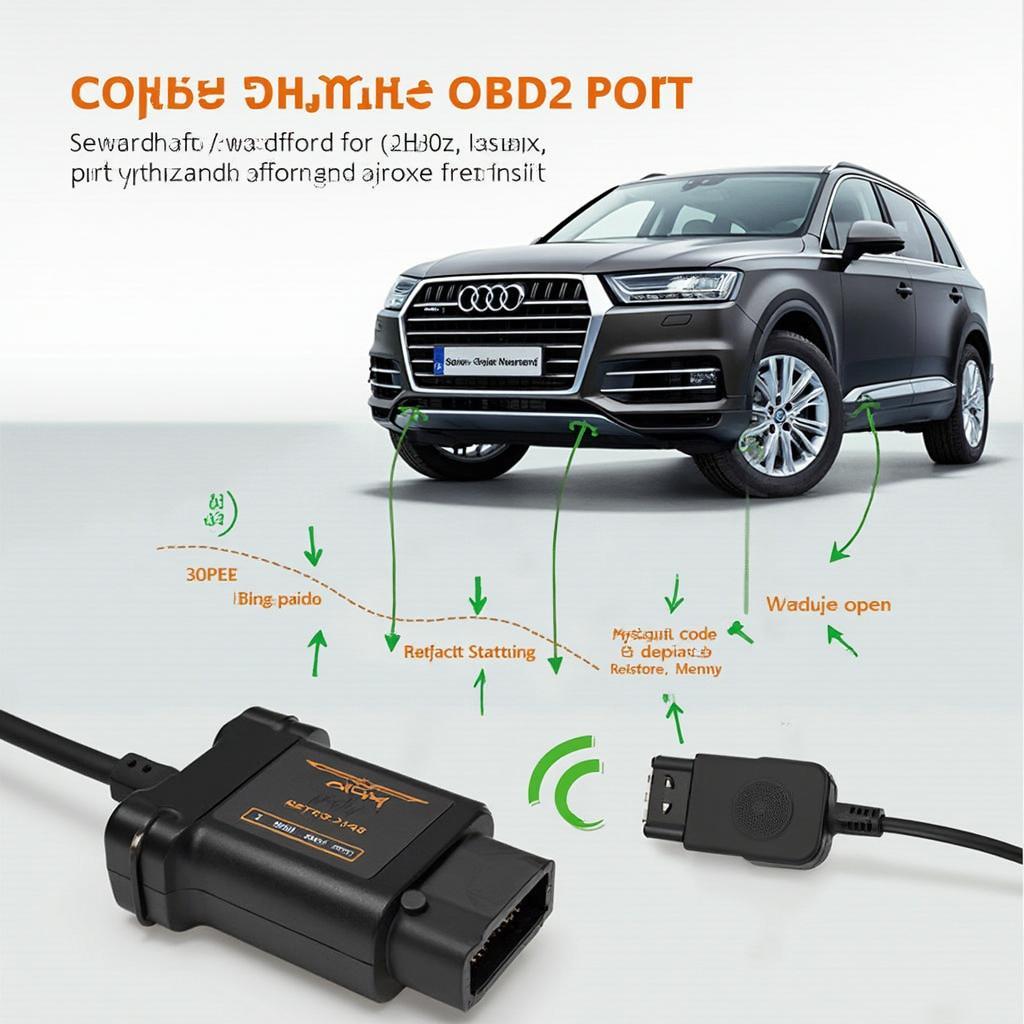Your cart is currently empty!

Understanding OBD2 Kits: The Essential Guide to Car Diagnostics
Obd2 Kits have become indispensable tools for car owners and mechanics alike, providing a window into the inner workings of modern vehicles. Whether you’re a DIY enthusiast looking to troubleshoot a check engine light or a professional seeking advanced diagnostics, understanding OBD2 kits is crucial for maintaining and repairing vehicles effectively.
What is an OBD2 Kit?
An OBD2 kit, short for On-Board Diagnostics 2, refers to a suite of tools and software designed to communicate with a vehicle’s onboard computer system. The heart of this system is the OBD2 port, a standardized 16-pin connector typically located under the driver’s side dashboard.
 OBD2 Port in a Car
OBD2 Port in a Car
Through this port, an OBD2 kit can access a wealth of information from the vehicle’s Engine Control Unit (ECU) and other modules, including:
- Diagnostic Trouble Codes (DTCs): These codes pinpoint specific areas within the engine and emission control systems that are malfunctioning.
- Real-time Sensor Data: OBD2 kits display live data streams from various sensors, offering insights into engine performance, fuel efficiency, and more.
- Freeze Frame Data: This snapshot of sensor readings taken at the moment a fault occurred helps diagnose intermittent problems.
Types of OBD2 Kits
OBD2 kits come in various forms to cater to different needs and budgets:
1. Basic Code Readers:
These entry-level devices primarily read and clear DTCs. They are affordable and user-friendly, suitable for basic troubleshooting.
2. Bluetooth OBD2 Scanners:
These compact scanners connect wirelessly to your smartphone or tablet, allowing you to access diagnostic data through dedicated apps. They offer greater functionality and portability compared to basic code readers.
3. Professional OBD2 Scanners:
These advanced tools offer comprehensive diagnostic capabilities, including live data graphing, ECU coding, and bi-directional control. They are favored by professional mechanics and serious DIYers.
 Various OBD2 Scanners
Various OBD2 Scanners
Why Use an OBD2 Kit?
Investing in an OBD2 kit offers numerous benefits:
- Save Money on Repairs: By identifying the root cause of car problems, you can avoid unnecessary repairs and costly visits to the mechanic.
- Improve Fuel Efficiency: Monitoring sensor data like oxygen sensor readings can help optimize engine performance and improve fuel economy.
- Gain Peace of Mind: Regular vehicle diagnostics with an OBD2 kit provide assurance that your car is running smoothly and identify potential issues before they escalate.
- Enhance Resale Value: Maintaining a detailed service history using an OBD2 kit demonstrates responsible car ownership and can increase your vehicle’s resale value.
Choosing the Right OBD2 Kit
Selecting the appropriate OBD2 kit depends on your needs and expertise:
For Casual Car Owners: A basic code reader or a Bluetooth OBD2 scanner paired with a smartphone app offers sufficient functionality for basic troubleshooting and maintenance.
For DIY Enthusiasts: Consider a more advanced Bluetooth scanner or a dedicated handheld device that provides live data streaming and additional features.
For Professionals: Invest in a professional-grade OBD2 scanner with comprehensive diagnostic capabilities, including ECU coding and bi-directional control.
Beyond Diagnostics: Advanced Applications of OBD2 Kits
Beyond their diagnostic prowess, OBD2 kits are increasingly being used for innovative applications:
Performance Tuning: Enthusiasts use OBD2 data to monitor and fine-tune engine parameters for improved performance.
Fleet Management: Businesses utilize OBD2 data to track vehicle location, fuel consumption, driver behavior, and optimize fleet operations.
Insurance Telematics: Insurance providers leverage OBD2 data to assess driving habits and offer personalized insurance premiums.
 OBD2 Kit in Use
OBD2 Kit in Use
Conclusion
OBD2 kits have revolutionized car maintenance and repair, empowering car owners and mechanics alike to understand and address vehicle issues effectively. Whether you’re a casual driver or a professional technician, investing in the right OBD2 kit can save you time, money, and provide valuable insights into your vehicle’s health. By understanding the capabilities and applications of OBD2 technology, you can make informed decisions about maintaining and repairing your car, ensuring its optimal performance and longevity.
FAQs about OBD2 Kits
1. Will any OBD2 kit work with my car?
Most OBD2 kits are compatible with vehicles manufactured after 1996 in the United States. However, it’s always recommended to check the specific kit’s compatibility with your car’s make, model, and year.
2. Can I use an OBD2 kit to clear the check engine light?
Yes, most OBD2 kits allow you to read and clear Diagnostic Trouble Codes (DTCs), which will typically turn off the check engine light. However, it’s crucial to address the underlying issue that triggered the light in the first place.
3. Do I need a professional to use an OBD2 kit?
Basic OBD2 code readers are user-friendly and require minimal technical expertise. However, more advanced scanners with live data streaming and coding capabilities might demand some technical knowledge.
4. How often should I use an OBD2 kit?
It’s good practice to scan your vehicle for DTCs and check sensor data periodically, especially if you notice any unusual performance issues. Monthly checks are a good starting point.
5. Are there any risks associated with using an OBD2 kit?
Using an OBD2 kit correctly poses minimal risks. However, attempting advanced procedures like ECU coding without proper knowledge could potentially cause issues with your vehicle’s electronics.
For more in-depth information and reviews on specific OBD2 kits, you can visit the following pages:
For inquiries about our products or assistance with choosing the right OBD2 kit for your needs, our team is available 24/7 via WhatsApp: +1(641)206-8880, or Email: [email protected].

Leave a Reply